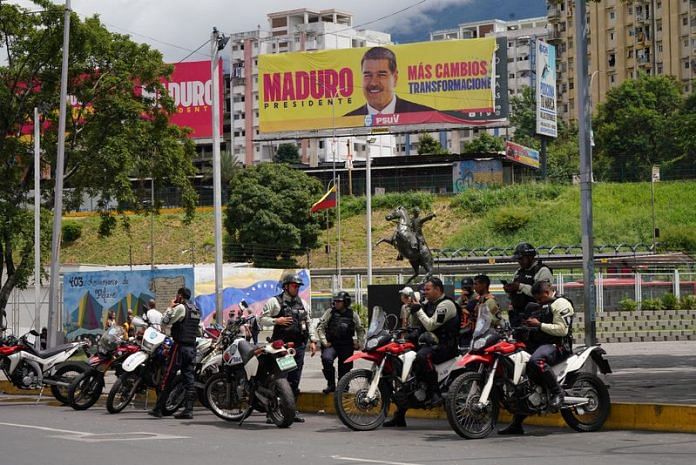By Mircely Guanipa and Tibisay Romero
MARACAY/VALENCIA, Venezuela (Reuters) -Stores were closed and buses not running around much of Venezuela on Wednesday, as tensions over a disputed presidential election and rumors of opposition arrests kept many people home.
Socialist President Nicolas Maduro, who has ruled since 2013, was declared the winner of the weekend vote by the electoral council. But the opposition says its tally of about 90% of votes shows that its candidate Edmundo Gonzalez received more than double the support attracted by Maduro.
The U.S.-based Carter Center, which observed the vote, said in a statement late on Tuesday that the election “cannot be considered democratic.” It said the process was flawed throughout and called the electoral authority’s failure to publish disaggregated results a “serious breach.”
Maduro on Wednesday presented a writ to Venezuela’s top court to “activate an electoral dispute.”
“The United Socialist Party of Venezuela is ready to present 100% of the electoral tallies that are in our hands,” he said.
The United States, Brazil, Chile and others have urged the electoral authority – which the opposition accuses of being in Maduro’s pocket – to publish a full breakdown of results.
“Our patience and that of the international community is running out,” said White House national security spokesperson John Kirby on Wednesday. “It’s running out on waiting for the Venezuelan electoral authorities to come clean and release the full detailed data on this election.”
The dispute has led to widespread protests that Maduro and his government have denounced as an attempted coup. Gonzalez has said 11 protesters have died.
Maduro has said Gonzalez and Machado should be held accountable for alleged crimes of the protesters.
Jorge Rodriguez, the head of the Congress for Maduro’s ruling socialists, insisted on Tuesday that both opposition figures should be arrested.
“The bosses (of the protesters) should go to prison,” he told lawmakers.
The government has said two members of the security forces also died and has invited people to report crimes associated with what it calls “fascist activities” via an app.
Fears were growing among the opposition on Wednesday that police would arrest Gonzalez and Machado, who last appeared in public in Caracas on Tuesday.
“I alert the world about a cruel and repressive escalation by the regime,” Machado said on X on Wednesday.
Attorney general Tarek Saab said 162 people had been arrested and 77 public officials injured in the protests.
Last week, he denied to Reuters that Venezuela prosecutes people for their political beliefs.
Opposition members who have sought asylum at the Argentine ambassador’s residence in Caracas said on social media there were police cars parked outside and the building’s electricity had been cut.
The six staffers have lived at the embassy since March, when warrants were issued for their arrests, part of a series of warrants and arrests directed at the opposition prior to election day.
Brazil has urged Maduro to respect the boundaries of the Argentine embassy in Caracas, according to a Brazilian official familiar with the matter.
Voluntad Popular said its national coordinator Freddy Superlano was detained on Tuesday. Saab has not responded to a request for comment on Superlano’s detention.
Ricardo Estevez, a senior official with Machado’s party Vente Venezuela, was also arrested, the party said.
NO BUSES, CLOSED SHOPS
In the capital Caracas many shops were open, though lines were long and some products were low in stock, and there was increased military presence around the presidential palace, according to Reuters witnesses.
Vegetables and other perishables were especially scarce and could take more time, even days, to begin to arrive in stores, retail sector sources said.
Public transport in other cities and towns across Venezuela was operating at reduced volume and many stores either remained closed or planned to shut early.
Bus drivers in Maracay were not working out of fear of being on the roads, they said, while San Cristobal’s bus terminal was open but had no buses to dispatch. The terminal in Barquisimeto was closed.
“I came on bicycle because there’s no public transport,” said supermarket worker Jose Marcano, 32, in the central city of Valencia. “There are very few workers in the supermarket and though my work is administrative, I’ll be helping at the check-out.”
State oil company PDVSA said in a statement that gas stations nationwide would be open but lines in many places were long.
“I’m anxious,” said 85-year-old America Guerrero, who was trying to get from central Maracay to her home in Tejerias, near Caracas. Tickets were going for an elevated $20. “They don’t want to give people a way out, people are tired.”
Since Sunday, Reuters witnesses in several cities have seen clashes between security forces and opposition protesters, as well as attacks on protesters by ruling party-allied motorcycle riders known as collectives.
Maduro supporters, meanwhile, said at a Tuesday march that the election was decided.
Waves of anti-government protests in 2014, 2017 and 2019 led to hundreds of deaths and failed to dislodge Maduro.
Two opposition sources, who asked to remain anonymous, told Reuters that the opposition is focused on pressuring the government to release all the vote tallies.
Machado on Wednesday thanked election witnesses and those who had uploaded their tallies to the opposition’s website, saying: “You will belong to the victory!”
Other opposition pathways to power could include a negotiated solution or the hope that the protests will increase foreign pressure on the government.
(Reporting by Mircely Guanipa in Maracay and Tibisay Romero in Valencia; Additional reporting by Deisy Buitrago, Mayela Armas and Vivian Sequera in Caracas, Tathiana Ortiz in San Cristobal, Mariela Nava in Maracaibo, Keren Torres in Barquisimeto, Maria Ramirez in Puerto Ordaz, Stephanie Kelly in Washington and Lisandra Paraguassu in Brasilia; Writing by Julia Symmes Cobb; Editing by Rosalba O’Brien and Daniel Wallis)
Disclaimer: This report is auto generated from the Reuters news service. ThePrint holds no responsibilty for its content.



